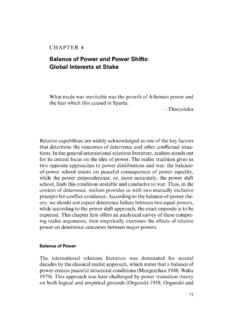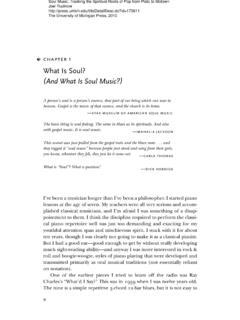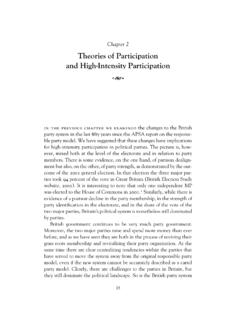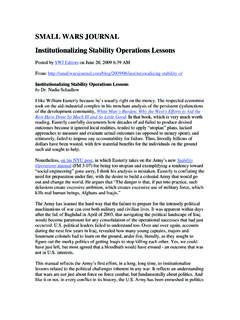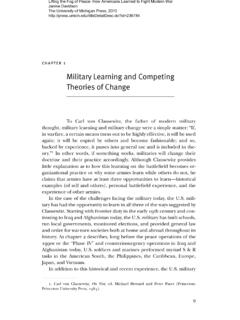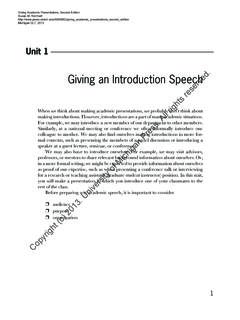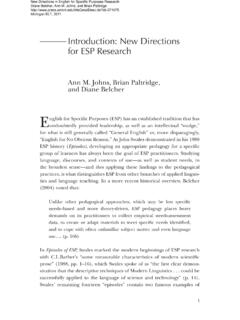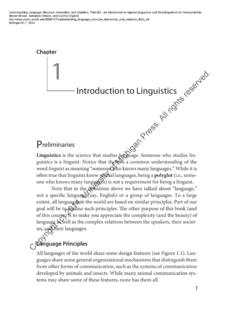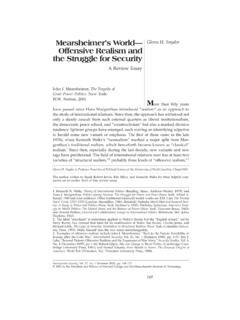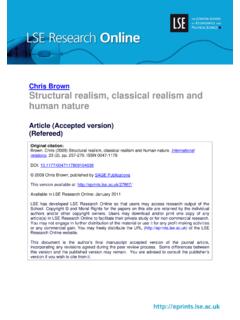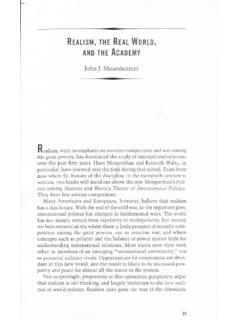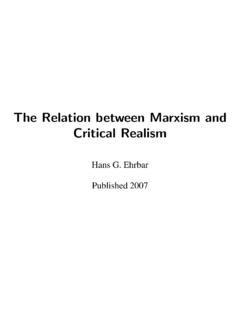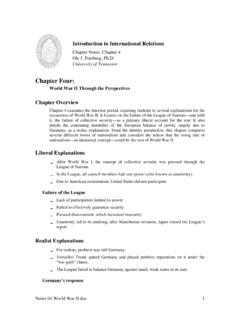Transcription of The Theory of International Politics
1 CHAPTER 1 The Theory of International Politics Therefore, the seeker after the truth is not one who studies the writingsof the ancients and, following his natural disposition, puts his trust inthem, but rather the one who suspects his faith in them and questionswhat he gathers from them, the one who submits to argument anddemonstration, and not to the sayings of a human being whose nature isfraught with all kinds of imperfection and de ciency. Thus the duty ofthe man who investigates the writings of scientists, if learning the truthis his goal, is to make himself the enemy of all that he reads, and, apply-ing his mind to the core and margins of its content, attack it from everyside.
2 He should also suspect himself as he performs his critical examina-tion of it, so that he may avoid falling into either prejudice or leniency.(Ibn al-Haytham)1 Since the end of World War II, debates about the relation between warand the state among political scientists in the United States have beendominated by a body of ideas commonly called realism and the criticismsthose ideas have every author who wants to writesomething portentous about International Politics either defends realism ,invents a new species of it, or uses it as a point of departure for some other ism that he or she wants to defend.
3 Prominent among these alternativesto realism have been Liberalism (including what has been called neolib-eral institutionalism) and mathematical models based on the Theory of games have beenused to evaluate the competing claims made by Realists and their critics,debates about realism have become embroiled in controversies aboutgame Theory , the use of mathematics to describe human behavior, andsomething called rational choice Theory . Some Constructivists haveclaimed that what is at stake is nothing less than fundamental issues in thephilosophy of science or even something called ontology. The result hasbeen not only to make the controversies provoked by realism even more1.
4 Quoted in Sabra 2003, I will always capitalize the term Realismwhen I use it to refer to the academic doctrinethat goes by that name among students of International cult to settle but also to create confusion about what a Theory of inter-national Politics might consist of or how to evaluate , Arguments, and ExplanationsI will argue that the fundamental cause of the unproductive nature of thesecontroversies has been the willingness of political scientists to tolerateincomplete arguments. Indifference to the validity of arguments is oftenjusti ed by the claim that the issues raised in these debates are fundamen-tally empirical ones and that therefore they can only be settled by lookingat the facts.
5 If what I have to say is to be persuasive, I must show why thiscommon view is mistaken. Let us begin, then, by looking at a few simpleexamples that will make this and ExplanationsSuppose you went to the dog pound to look for an inexpensive dog andwanted to make sure that any dog you got had a friendly disposition, wasgood with children, and would not maul a passing stranger. Suppose theattendant assured you that a particular dog would have those , you might ask, How do you know that, and why should Ibelieve it? The attendant might reply that the dog in question was aLabrador retriever. So? you might reply, to which the attendant mightrespond that Labrador retrievers are friendly dogs and are good attendant s answers to your questions can be interpreted as anargument, perhaps the simplest possible argument that actually conveysnew information.
6 It has two premises: Labrador retrievers are friendlyand good with children and This dog is a Labrador retriever, fromwhich it follows that This dog will be friendly and good with children, which is what you wanted to know. The conclusion follows from thepremises only because if one accepts the premises and denies the conclu-sion one would have contradicted oneself, which is why if one believes thepremises one must also believe the conclusion. Arguments that have thisproperty are called valid arguments, and reasoning from premises to con-clusion in this way is commonly called deductive reasoning.
7 However, this little argument would satisfy you only if you werecon dent that both of the premises were true. If one or both were not true,the argument would remain valid but the conclusion might be false. Sup-pose, then, that you asked why you should believe that this dog was aLabrador retriever this is, after all, the dog pound. The attendant mightreply that Labrador retrievers had certain recognizable characteristics2 WAR AND THE STATE such as a large, square head, short hair, a wide chest, and a friendly dispo-sition, and this dog had those rst glance this looks like a deductive argument just like the rstone: the rst premise is that Labrador retrievers have certain recognizablecharacteristics, and the second is that this dog has all those if so, the argument is not valid, because it does not follow from thesetwo premises that the dog is a Labrador retriever.
8 Such an argumentwould be an example of a logical fallacy called af rming the consequent and therefore could not provide the assurance you were looking this would be a misunderstanding of the attendant s attendant is saying that the hypothesis that the dog is a Labradorretriever would explain its appearance, and thus its appearance gives usreason to believe that it is a Labrador retriever. There is a deductive argu-ment here, but its premises are that All Labrador retrievers have certainrecognizable characteristics and This dog is a Labrador retriever, fromwhich it would follow, if true, that this dog would have the properties of aLabrador retriever.
9 But this is something that one does not have to be per-suaded of, since the dog can be inspected directly. The question is, rather,what sort of dog is it? And the reasoning is that, since these premises, iftrue, would imply that the dog would have the appearance that it doeshave, the fact that it has that appearance is evidence that the premises aretrue. This is an example of what is commonly called inductive reason-ing, and the problem of induction is to gure out what justi es an infer-ence of this we do not require a justi cation for reasoning in this way to do is important here is, rather, the fact that the inductive inference fromthe dog s visible characteristics to its breed is made possible by a deductiveinference from the breed to a dog s visible characteristics.
10 If the breedcould not explain its appearance, then the breed could not be inferred fromthe problem is that there are other possible explanationsof the dog s appearance, some of which might imply that it would be dan-gerous, and that is why inductive inference requires not just identifying apossible explanation of the facts but also supplying reasons to believe thatThe Theory of International Politics33. Probability Theory provides a plausible answer to that question, since such an inferencecan be shown to be an application of Bayes s rule. For a recent discussion by a philosopher,see Howson 2000. For a discussion by a physicist, see Jaynes A person who did not engage in inductive reasoning would not soon survive, since unlikemost animals the behavior encoded in the genes of human beings is inadequate for humansto cope with their environment.
